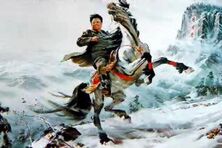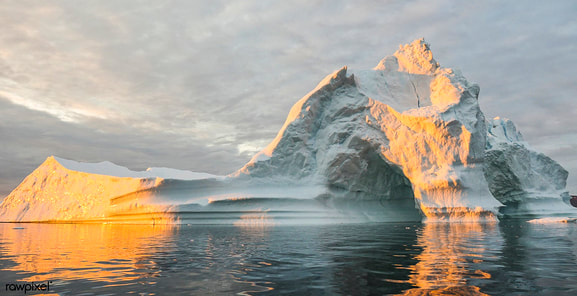Why does it seem that we are on a crash course towards an impending doom? As humans, we have known about our impact upon global climate since the early 1900s through greenhouse gases, but we have still not made any considerable efforts to collectively reduce our toll upon global climate (Climate Change History - HISTORY). While some people are noticing the doom that awaits us if nothing changes, others still deny the reality of the situation.
0 Comments
 New York City is a place that is recognized around the world. In 2018, New York City was visited by almost 15 million people (NYC Tourism Facts & Statistics | Sea The City)! In 2020, I was also a visitor to New York City, before the pandemic of course. Having been there, I can see why this city is so popular. It is a symbolic representation of the heart of the capitalistic empire that we have created here in the United States. From skyscrapers to bustling stores and roadways, New York City embodies a capitalistic economy. This reality is why I find Colson Whitehead’s choice for setting in this apocalyptic narrative so intriguing. More specifically, in Zone One, it seems like Whitehead’s choice of New York City as the setting for his zombie apocalypse served a deeper purpose than a drastic comparison. At a deeper level, Whitehead may be hinting at the potential travesty that may result from the capitalistic empire that we have created in America. After all, in this city with the tallest building and the brightest colors, there seem to be a lot more significant issues. For starters, as often noted by critics of capitalism, there is a huge problem of wealth inequality in New York City. In fact, the top 1% of income in New York City makes 142 times that of the bottom 99% (Infographic shows New York has the highest income inequality (news10.com))! When you take into consideration that the cost of living and taxes are astronomical in New York relative to other areas of the United States, this inequality becomes even more drastic. When many people in New York City are struggling to live comfortable lives and the top 1% of earners are making 142 times that of the people that are struggling, I think it is more than reasonable to ask if there is room for improvement in the economy that we have built. While those that argue against this reconsideration argue that other economies have their own issues, that should not be an excuse for examining solutions to the problems that our economic system seems to be creating. It will likely only get worse over time, so we must address it before our illustrious world crumbles around us due to unequal earnings.  In my opinion, there is a reason why propaganda is so frequently used by governing bodies to control the mindset of their citizens. According to dictionary definition, propaganda is ideas, facts, or allegations that are spread deliberately to further one's cause or to damage an opposing cause (Propaganda | Definition of Propaganda by Merriam-Webster). Simply put, it is a very effective way of getting everyone on the same page. In turn, by uniting the general population toward a common cause, more power is granted toward the ruling class. This control over the general population can be utilized or even weaponized to create an outcome that the ruling class envisions. After all, why would those in charge want to do the dirty work if someone else can do it for them? Of course, there are many well-known historical examples where this has occurred, such as in Nazi Germany during World War II for instance. However, I would like to discuss a modern-day example of propaganda being used to weaponize people. After all, history is bound to repeat itself if we are not careful. Specifically, the Chinese are actively using propaganda to eliminate the Uighur Muslim ethnic minority group in China (China’s repression of Uighur Muslims: Concentration camps, forced labor, and other abuses - Vox). The justification for this abhorrent act is to homogenize religion in China. By reprogramming their citizens through the weapon of propaganda, they are actively approaching their goal of eliminating this culture from their population, which would bring less internal division amongst their citizens from their perspective. In American War, Omar El Akkad was also examining this idea that people can be weaponized through means such as propagand. He examines this reality near the end of the novel where Sarat unleashes a plague that kills around 100 million people. Would she have done this if she were not subject to years of ideological brainwashing and torture? You cannot say for certain, but I believe that she would not have reached this decision to kill millions of people if she had been gifted a different circumstance. So then how do we prevent people from becoming weaponized? In my opinion, education is the key here. Think about it, if the Chinese were actively being educated about the rich and diverse Muslim culture, would the general population still want to isolate and reeducate these people? I firmly believe they would not. Instead, they would be interested in their different lifestyle and respect their differences. Sadly, they are not allowed access to this type of educational material, so we can only hope that are able to learn circumstantially.  Merriam-Webster defines culture as the characteristic features of everyday existence shared by people in a place or time (Culture | Definition of Culture by Merriam-Webster ). Integral to this simplistic interpretation of culture is the idea that culture and our existence are inseparable. In other words, if we exist, we will have some culture. What happens if our existence begins to crumble, such as in an apocalypse? In Station Eleven, Emily St. John Mandel examines this reality. More specifically, Mandel creates a world that is crumbling from a highly contagious pandemic. Having said this, amid a collapsing world, Mandel spends a great deal of time examining the culture in this collapsing world. In my opinion, this was intentional. Not only does she use the Travelling Symphony to show how a new culture was created in this apocalyptic world, but she also uses the culture of the world prior to the apocalyptic pandemic to influence the actions of the characters in the story. An example of this latter point is the creation of the Prophet through the literary work of Miranda in this story. Ironically, this literary work was also called Station Eleven. What was Mandel trying to accomplish with this intertwinement of culture in her apocalyptic narrative? In my opinion, I think that she was just trying to emphasis the significance of literature, art and music in apocalyptic times. Evidence for this can be seen near the end of the novel when almost all the characters examined throughout the story convene at the Museum of Civilization. I view this as evidence simply because at the heart of this rebirthing civilization was a location of cultural significance. In other words, it seemed to me that the author was subliminally suggesting that civilization could not be reborn without a foundation of culture. Does this mean that our survival in an upcoming apocalypse will heavily depend upon culture? I believe it does, and I am glad I was able to examine this crucial and often forgotten aspect in Mandel’s novel. If we are missing cultural elements of our world pre-apocalypse, it will be difficult to rebuild the world as we know it post-apocalypse.  Evolution is a concept that has been around since the 19th century. More specifically, Darwin and other biologists of this era found reasonable evidence to suggest that the diversity of life on earth originates from preexisting types that have differentiated through several generations. Originally, this evidence was found in fossils, comparative studies and geographic distributions. Later on, the evidence for evolution grew into fields of genetics, biochemistry, ecology and molecular biology (https://www.britannica.com/science/evolution-scientific-theory). Since this revelation in biological theory, there has always been an assumption that evolution is a process that always moves forward. By forward, I mean in a manner that further or develops or differentiates the existing life on earth. This thought process makes sense because it centered on the idea of natural selection. Simply put, natural selection is a process where a mutated genetic code is naturally selected for because it confers an increased chance of survival and reproduction in the given population (https://plato.stanford.edu/entries/natural-selection/). In other words, natural selection is what moves evolution forward. What about backwards? In Future Home of the Living God, Louise Erdrich examines the idea of ‘reverse evolution’. In her story, she tells of a woman named Cedar that is pregnant in an apocalyptic world where the diversity of life seems to be going in reverse. In my opinion, I feel like this scenario parallels our world to an extent. Think about it. We live in a world with massive wildfires, natural disasters, and melting tundra. The diversity of our world is actively decreasing. Are their consequences in a world that seems to be evolving backward? Certainly. Erdrich points this out in her novel through her depiction of societal chaos. The diversity of our world creates feelings of security, prosperity and longevity. Without this, our complex way of life on earth nowadays is crippled. In turn, this crippling way of life drives fear that leads to the collapse of vast societies. What can be done to ensure that we do not reach the point of collapse? Not changing anything has not seemed to achieve anything worthwhile, so it might make more sense to address certain aspects of our world that may contribute to this upsetting situation. This, of course, is easier said than done.  How does religion influence apocalyptic circumstances? We all have experienced religion in some form or fashion in our lives most likely, but does religion truly play a crucial role during an apocalypse? I believe it most certainly does, and I think that Margaret Atwood does a phenomenal job of exploring the significance of religion in The Year of the Flood. The word apocalypse was first recorded in both Latin and Greek in the 12th century. In those days, it was literally translated to ‘revelation’ or, in other words, an uncovering. Nowadays, this word certainly bears a religious connection through the book of Revelation in the Bible, where there is prophecy of a day where good will inevitably conquer evil. However, it can also be utilized in a more negative way. More specifically, many people tend to use this word to refer only to an impending doom that lurks in the future (Apocalypse | Definition of Apocalypse at Dictionary.com). I find this broad definition of the word extremely intriguing. It seems suggestive that there is a dichotomy of beliefs pertaining to the nature of an apocalypse: there are those that may embrace the apocalypse and those that fear the apocalypse. I believe that Atwood examines this dichotomy as well. More specifically, she uses the God’s Gardeners and the MaddAddams sects to contrast the differing definitions of an apocalypse. The God’s Gardeners seemingly embrace the days of impending doom because they feel as if they are prepared for them. Further, they believe that the doom will eventually bring a renewed world where those that brought destruction to the world around them will be gone. In contrast, the MaddAddam faction holds to the negative beliefs of an apocalypse in the sense that they fear the impending doom. Moreover, they want to avoid it by taking decisive and even violent action against those that are leading the world towards this doom. In turn, it seems that the influence of religion in an apocalypse stretches beyond simply creating community or safety. It strives to coerce the individual to think a certain way. Christianity, for instance, achieves this through the belief that the end of the world will coincide with the return of Christ. This results in Christians sometimes embracing the apocalypse as simply a new beginning (The Meaning of Apocalypse in the Bible). While there is nothing inherently wrong with this sense of hopefulness, it may be neglectful of the potential travesties that may loom in the distance that could be avoided with preemptive action. Thus, the best definition of an apocalypse is likely one that encompasses both the fear and new beginnings brought about by it. |
AuthorThis blog was created by Bobby Leeper. He is a student at Wright State University studying both biological sciences and Spanish. Archives
April 2021
Categories |

 RSS Feed
RSS Feed
